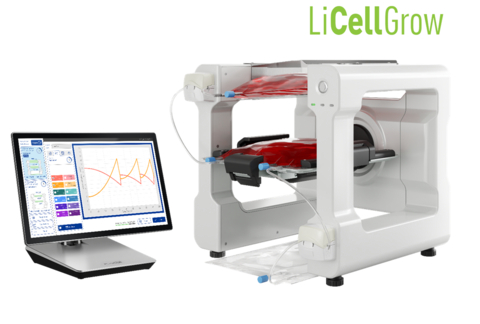
PHC and CCRM Collaborate to Develop Primary T-Cell Expansion Culture Processes to Enhance Efficiency and Improve Cell Quality
PHC Corporation has signed a Master Collaboration Agreement with CCRM to work together on the development of primary T-cell(*1) expansion culture processes that will seek to accelerate the manufacturing of cell and gene therapy (CGT) products. This joint initiative will integrate “LiCellGrowTM(*2), PHC’s cell expansion system under development, with CCRM’s deep knowledge of regenerative medicine and biomanufacturing to establish new culture processes to improve cell culture efficiency and quality for CGTs.
This press release features multimedia. View the full release here: https://www.businesswire.com/news/home/20250209611769/en/

*For research purposes only. Anticipated visual image of LiCellGrow. All features subject to change. (Graphic: Business Wire)
Primary T-cells are used in process development and manufacturing for CGTs, such as in CAR-T cell therapy.(*3) However, primary T-cells derived directly from patients often exhibit significant variability in growth rates and quality, making it challenging for researchers to ensure stable cell counts and maintain quality throughout the culture process. To address these challenges and improve the quality of cell-based therapeutics, better cell culture processes are needed.
Chikara Takauo, Director of PHC and Head of the Biomedical Division that leads the company’s Life Science business, commented: "We are delighted to begin this joint research and development initiative with CCRM, a leader with 14 years of experience in the commercialization of regenerative medicine and CGT. By combining the technologies and expertise of both of our organizations, we aim to advance the manufacturing processes for cell-based therapeutics and cell culture technologies, contributing to the early practical application of CGT."
PHC has developed proprietary In-Line monitoring technology to track key indicators of cell metabolism in real-time, which can help researchers address issues like cell quality and reproducibility, and establish optimal cell culture methods. This technology enables precise, continuous measurement of glucose uptake and lactate production during cell culture, providing a more precise understanding of changes in cell metabolism over time than is possible to observe using traditional sampling methods. In 2024, PHC launched the live-cell metabolic analyzer "LiCellMoTM(*4)" incorporating this technology in the United States, Canada, Europe and some Asian markets including Japan, China, Singapore and Taiwan.
Building on this technology, the company is also developing "LiCellGrow," a cell expansion system designed to exchange media automatically based on the metabolic state of the cells and to maintain the culture environment in an optimal state. PHC aims to further expand its product lineup to seamlessly support research, process development, and commercial manufacturing of cell-based therapeutics.
"We are excited to collaborate with PHC to unlock new possibilities in cell culture,” explained Michael May, President and CEO of CCRM. “Technology development partnerships, like this one, are key to advancing the industry and making CGT more cost effective, and therefore more accessible to patients around the world.”
The joint research with CCRM will allow PHC to analyze culture conditions using "LiCellGrow" to establish optimal culture processes for primary T-cells. The collaboration will seek to accelerate LiCellGrow’s development, contributing to improved cell quality, enhanced manufacturing efficiency, and cost reduction in the production of cell-based therapeutics.
(*1) Primary T cells, or autologous T cells, refer to T cells that are directly isolated from the body. T cells are part of the immune system and develop from stem cells in the bone marrow. They help protect the body from infection and may help fight cancer.
https://www.cancer.gov/publications/dictionaries/cancer-terms/def/t-cell
https://www.cancer.gov/search/results?swKeyword=autologous
(*2) URL: http://www.phchd.com/us/biomedical/licellgrow
(*3) CAR T-cell therapy is a type of treatment in which a patient's T cells (a type of immune system cell) are changed in the laboratory so they will attack cancer cells.
https://www.cancer.gov/publications/dictionaries/cancer-terms/def/car-t-cell-therapy
(*4) URL: https://www.phchd.com/us/biomedical/live-cell-metabolic-analyzer
About the Biomedical Division of PHC Corporation
Established in 1969, PHC Corporation is a Japanese subsidiary of PHC Holdings Corporation (TOKYO: 6523), a global healthcare company that develops, manufactures, sells, and services solutions across diabetes management, healthcare solutions, diagnostics and life sciences. The Biomedical Division supports the life sciences industry helping researchers and healthcare providers in around 110 countries and regions through its PHCbi-branded laboratory and equipment and services including CO2 incubators and ultra-low temperature freezers.
www.phchd.com/global/phc
About PHC Holdings Corporation (PHC Group)
PHC Holdings Corporation (TOKYO: 6523) is a global healthcare company with a mission of contributing to the health of society through healthcare solutions that have a positive impact and improve the lives of people. Its subsidiaries (referred to collectively as PHC Group) include PHC Corporation, Ascensia Diabetes Care, Epredia, LSI Medience Corporation, Wemex and Mediford. Together, these companies develop, manufacture, sell and service solutions across diabetes management, healthcare solutions, diagnostics and life sciences. PHC Group’s consolidated net sales in FY2023 were JPY 353.9 billion with global distribution of products and services in more than 125 countries.
www.phchd.com/global
About CCRM and OmniaBio
CCRM is a global, public-private partnership headquartered in Canada. It has received funding from the Government of Canada, the Province of Ontario, and leading academic and industry partners. CCRM supports the development of regenerative medicines and associated enabling technologies, with a specific focus on cell and gene therapy. A network of researchers, leading companies, investors, and entrepreneurs, CCRM accelerates the translation of scientific discovery into new companies and marketable products for patients with specialized teams, dedicated funding, and unique infrastructure. In 2022, CCRM established OmniaBio Inc., a commercial-stage CDMO for manufacturing cell and gene therapies. CCRM is hosted by the University of Toronto. Visit us at ccrm.ca.
View source version on businesswire.com: https://www.businesswire.com/news/home/20250209611769/en/
Distribution channels:
Legal Disclaimer:
EIN Presswire provides this news content "as is" without warranty of any kind. We do not accept any responsibility or liability for the accuracy, content, images, videos, licenses, completeness, legality, or reliability of the information contained in this article. If you have any complaints or copyright issues related to this article, kindly contact the author above.
Submit your press release